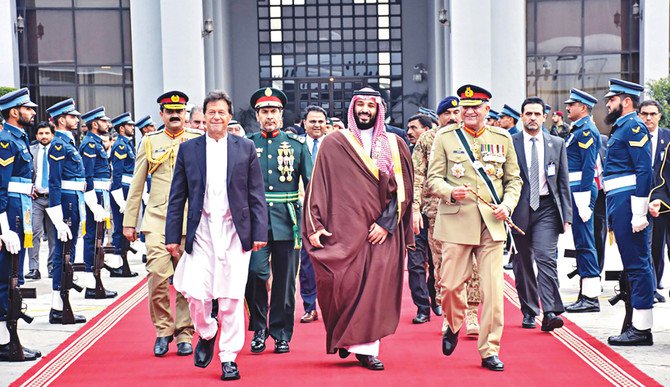
Visit to Pakistan, India and China proves strategic for Saudi Arabia
The three-country tour of Asia by Crown Prince Mohammed bin Salman that came to a close this weekend was an economic and strategic success, experts say.
“Saudi Arabia might be seen by some as moving to the East,” Salman Al-Ansari, founder of the Saudi American Public Relation Affairs Committee (SAPRAC), told Arab News. “The correct way to put it is that it’s spreading its wings East and West.
“Economic diversification requires strategic diversification. This should not be seen in any way as Saudi Arabia giving the cold shoulder to its most trusted allies, specifically the US,” he said. “And as Joseph Parry said: ‘Make new friends but keep the old; those are silver, these are gold.’”
The tour, which saw Saudi Arabia’s crown prince warmly welcomed by the leaders of Pakistan, India and China, is in line with the crown prince’s Vision 2030, which plans to transform Saudi Arabia’s economy that relies on crude oil exports into a vibrant, diversified economy. The tour resulted in billions of dollars in economic deals as well as initiatives to increase security and combat terrorism.
“Saudi Arabia is the one and only country that can take the leadership position on the global efforts of combating terrorism, specifically in the ideological front,” Al-Ansari said.
Hamdan Al-Shehri, a political analyst and international relations scholar, said that China and Saudi Arabia have the same goals of security and stability. “China shares the Kingdom’s concerns and it knows that our continent has suffered from terrorism issues and international interventions and also troubles in the region.”
The two countries also improved on their mutually beneficial economic ties. As Al-Shehri pointed out: “China needs a huge energy source, and Saudi Arabia is one of these sources that can provide China with energy.”
One significant deal is the $10 billion refining and petrochemical complex, a joint venture between Saudi Aramco and Norinco, to be developed in the Chinese city of Panjin.
Also of great geopolitical significance is the $10-billion oil-refinery in Pakistan’s Gwadar Port, as it is one of the most important parts of China’s One Belt, One Road Initiative, Al-Shehri said. “Global players are willing to invest in this project. The Kingdom’s investment in this field will serve Pakistan and will benefit the Kingdom as well as the (China-Pakistan Economic Corridor).”
And despite its historical relationship with Pakistan, Al-Shehri said that the Kingdom also found common ground with India. For instance, the two countries agreed to set up a working group on counter-terrorism.
“India shares the Kingdom’s concern about instability in the seas, such as the Indian Ocean and the Red Sea. These are all places of global trade,” Al-Shehri said, adding that he hopes the Kingdom will play a role in resolving border points of contention between Pakistan and India as it did between Eritrea and Ethiopia.
It wasn’t all just business. The crown prince’s tour included some other announcements, including that 2,100 Pakistani and 850 Indian prisoners will be released from the Kingdom’s jails, that the Chinese language will be introduced in the Saudi school curriculum and that Saudi Arabia will soon host several concerts featuring major Bollywood performers.
The crown prince also called for the creation of a health center in Pakistan’s Khyber Pakhtunkhwa province dedicated to the memory of a Pakistani hero who saved 14 lives in Jeddah’s 2009 floods.

























